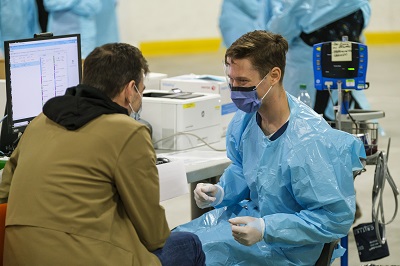 “In our study, the swab test detected more cases than the spit test,” said senior author Dr. Stephanie Johnson-Obaseki. “However, we feel that because the spit test is so much easier, it may still have a place in COVID-19 testing in certain situations.”A new study led by researchers at The Ottawa Hospital, University of Ottawa and the Public Health Agency of Canada’s National Microbiology Laboratory shows that a Canadian-made spit test can detect the COVID-19 virus. Although it does not pick up as many cases as the traditional swab test, the spit test is more comfortable than swab testing, which requires a health-care provider to insert a swab in the back of the nose or throat.
“In our study, the swab test detected more cases than the spit test,” said senior author Dr. Stephanie Johnson-Obaseki. “However, we feel that because the spit test is so much easier, it may still have a place in COVID-19 testing in certain situations.”A new study led by researchers at The Ottawa Hospital, University of Ottawa and the Public Health Agency of Canada’s National Microbiology Laboratory shows that a Canadian-made spit test can detect the COVID-19 virus. Although it does not pick up as many cases as the traditional swab test, the spit test is more comfortable than swab testing, which requires a health-care provider to insert a swab in the back of the nose or throat.
The study, published in Annals of Internal Medicine, involved 1,939 people who came to The Ottawa Hospital's COVID-19 Assessment Centre at Brewer Arena, and agreed to do both tests. To mimic mass screening, those being tested were either asymptomatic or had mild symptoms.
A total of 34 people in the study tested positive for COVID-19 with both the standard swab test and the experimental spit test, while 22 tested positive with the swab test alone and 14 tested positive with the spit test alone.
“In our study, the swab test detected more cases than the spit test,” said senior author Dr. Stephanie Johnson-Obaseki, a head and neck cancer surgeon at The Ottawa Hospital, assistant professor at the University of Ottawa and departmental research chair in quality improvement. “However, we feel that because the spit test is so much easier, it may still have a place in COVID-19 testing in certain situations. Further research is crucial in this rapidly-changing field.”
The spit test uses a DNA collection system developed by Ottawa-based company DNA Genotek. The company provided the collection system free of charge for the purposes of this study, but did not have a role in designing the study or interpreting the results. The spit samples were shipped to the National Microbiology Laboratory in Winnipeg for detection of COVID-19 genetic material using standard techniques.
“There are many different approaches and techniques that are in use or under development for COVID-19 testing and the saliva test could be the next advancement with more research,” said Dr. Guillaume Poliquin, Acting Scientific Director General at Canada’s National Microbiology Laboratory. “In addition to testing, it is important for all Canadians to follow public health guidelines if you are feeling sick to ensure that you keep yourself, your family and your community safe.”
Dr. Johnson-Obaseki had previously worked with DNA Genotek on a spit test to detect Human papilloma virus (HPV), which can cause certain kinds of cancer. Like many researchers at The Ottawa Hospital and the University of Ottawa, she rapidly applied her expertise to the global fight against COVID-19. Her team’s next step is to retest all the samples using an antibody test that can detect past infection with COVID-19.
“We hope that our research, and other research around the world, will lead to better and simpler testing for COVID-19,” said first author Dr. Lisa Caulley, an otolaryngologist - head and neck surgeon and associate scientist at The Ottawa Hospital, and junior clinical research chair at the University of Ottawa. “But no COVID-19 test will ever be perfect, so the most important thing is to stay home if you are feeling sick and follow all public health guidelines.”
The study was funded by The Ottawa Hospital Academic Medical Organization (TOHAMO). All research at The Ottawa Hospital is possible because of  The study involved 1,939 people who came to The Ottawa Hospital's COVID-19 Assessment Centre at Brewer Arena. support from generous donors to The Ottawa Hospital Foundation.
The study involved 1,939 people who came to The Ottawa Hospital's COVID-19 Assessment Centre at Brewer Arena. support from generous donors to The Ottawa Hospital Foundation.
The study was published on Friday, August 28, 2020, the same day that researchers from Yale University published results with another spit test for COVID-19.
COVID-19 spit tests are still considered experimental in Canada, and can only be used for research purposes.
Residents of Ottawa are encouraged to visit Ottawa Public Health’s website for more information about preventing the spread of COVID-19 and when to get tested.
Full reference: Salivary Detection of COVID-19. Lisa Caulley, MD, MPH, Martin Corsten, MD, Libni Eapen, MD, Jonathan Whelan, BSc, Jonathan B. Angel, MD, Kym Antonation, MPH, Nathalie Bastien, PhD, Guillaume Poliquin, MD, PhD. Annals of Internal Medicine. August 28, 2020. https://doi.org/10.7326/M20-4738.
The Ottawa Hospital is one of Canada’s top learning and research hospitals, where excellent care is inspired by research and driven by compassion. As the third-largest employer in Ottawa, our support staff, researchers, nurses, physicians, and volunteers never stop seeking solutions to the most complex health-care challenges. Our multi-campus hospital, affiliated with the University of Ottawa, attracts some of the most influential scientific minds from around the world. Backed by generous support from the community, we are committed to providing the world-class, compassionate care we would want for our loved ones. www.ohri.ca
Media contact
Jenn Ganton
jganton@ohri.ca
613-614-5253
